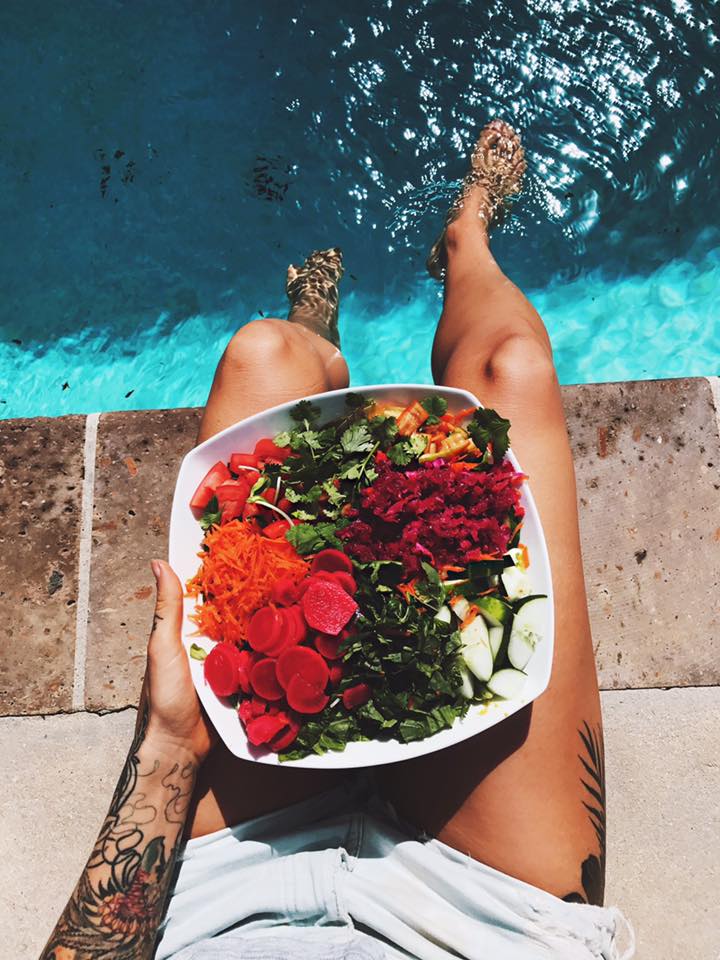I hear this all the time. The way we eat impacts literally every aspect of our lives from sleep and mood to energy levels and confidence. We are what we eat in more ways than one. The issue is that we have really calorie dense foods that are damn near void of nutrients and thus leave us full but starving. As a society and largely as a global community we have taken food from the forefront of our lives and have settled for what is sold to us by mega businesses selling us food like products to boost their share prices. If we look at the grocery store today it is much easier to purchase a ready-made meal that cooks in the microwave than to purchase fresh ingredients and make something that is both nutritious, balanced, and delicious. Essentially, we learn to overeat and the way that we view and approach food in this country lends itself to overeating. Before my husband and I got really into health and fitness we definitely ate way too much way too often. We would eat a lot of processed foods and we would eat out a lot. When I first started my health journey I worked at a famous pizza restaurant in San Francisco and I would bring home a regular pizza each night I worked and a dessert pizza, I would get home around midnight and Kevin and I would eat both pizzas and watch Netflix. It was our ritual and we would just zone out and eat. I know that is a common story, we just want to chill when we are done with our busy days and relaxation often comes with some snacks. Before we know it we can eat a whole pizza or a whole bowl of popcorn without much thinking and then we feel frustrated that we are not making headway on out goals. I have been there and I want to share some quick tips and tricks to curb overeating and get on track to the results you want!6 Ways to stop overeating.
6 Tips help you stop overeating.
1. Turn off the TV and put away the phone.
We all zone out from time to time and a little bit of escapism is not a bad thing from time to time but zoning out while you eat can be a recipe for disaster. Not only does eating dinner with the TV on or while scrolling on your phone disconnect you from those around you, it also prevents you from connecting to what and how much you are eating. We have probably all had a full bag of popcorn in our laps at the movies only to reach into the bag 10 minutes later to find it empty. We have also probably all eaten a bunch of snacks while cruising down the highway on a road trip. The issue that we have when we multi task while we eat is that we do not actually connect with our food. This means that we are not paying attention to how the food tastes, how it is making us feel, or when we have had enough. This can lead us to consuming a ton of extra, empty, and less than enjoyable calories. I recommend turning off the TV and putting the phone away while you eat so that you can actually connect with what you’re eating and who you are eating with and so you will know when you are overeating. Get out of the office for lunch and go eat with some coworkers. Being mindful of what goes into your body is never a bad thing and studies even show that it can aid in weight loss.
2. Stop eating out or just be smart about it.
But wait, you just said get out of the office and go eat with your coworkers. When we eat out at a restaurant it generally means that we are getting less than healthy food and a very large portion of it. I know that I have had multiple conversations with people about new restaurants that are in my area or where to eat while we are traveling and a regular prerequisite for recommendation is a massive portion size. It is hard to not eat everything on the plate if it tastes good and when given a ton of options that are delicious looking and smelling it is going to be tough to pick the salad and not be bitter about it. When you are trying to curb your overeating I recommend cooking your own meals when possible and putting the brakes on eating out for a while, it will make it easier for you in the short-term. If you absolutely have to eat out then I recommend being smart about it. Split an entrée with your friend or significant other and look at the menu before hand and choose something that will be healthy and definitely do not be afraid to order off the menu. If you cannot split something with someone then get a to go box up front and split your meal in half or take 20% of the food off of your plate immediately when they bring it to you. This will keep you from eating everything on your plate and also keep you from picking at your food when you are full.
3. Use smaller plates and bowls.
To me this makes a lot of sense. I know that I will generally serve myself much more than I need when I am serving myself lunch, dinner, or when I am at a party and there is a buffet or appetizers. I feel like it is human nature to want to fill your plate and there is ample evidence that people underestimate how much they serve themselves when they use larger dishes. Think about it, if you empty a small bag of chips into a small bowl the bowl is full and it looks like there are a lot of chips. If you empty the same small bag of chips into a large bowl the bowl is not full and you may think, we need more chips! It is just how we process things and when it comes to portioning our food we will likely use the space available to us and feel that we are not overeating. I know that the 21 Day Fix Portion Control Containers were a huge revelation to me because I literally did not understand how much I was supposed to be eating, even when I was eating “healthy foods”.
4. Slow down!
When I was thinking about this article I started to laugh because my husband and I joke sometimes about how fast he eats. It is like he is afraid someone is going to steal his food off of his plate. When we eat fast a few things are happening. We are not fully enjoying the food that we are eating and we are not giving our body time to process what we are eating and decide when we are full. Eating slowly has been shown to aid in weight loss and in helping people consume less food while still feeling full. You can take a bite of your food and then put the fork down and CHEW! Chewing plays a vital role in digestion and so many of us do not take the time to adequately chew our food. Slowing down can make eating more pleasant, make your digestion better, and let your body process what you are eating.
5. Don’t graze.
If it is not on your plate don’t eat it. When we cook we taste, it is what it is and you have to know how things are turning out. It gets out of hand when those tastes add up to a whole other meal. There is generally a whole lot of temptation when we are out and about as well, at a restaurant there is bread, at the office there may be a bowl of candy, at a friend’s house or even our own there may be a bowl of snacks out while cooking, these all need to be avoided to curb overeating. If it goes on your plate during your meal eat it, if it is not on your plate then don’t. All of those things we grab on a daily basis add up to a lot over time, it is the Compound Effect in action!
6. Plate yourself less food.
In his book Mindless Eating, Why We Eat More Than We Think, Brian Wansink has what he calls the Mindless Margin. This is the zone where we do notice that we are gaining weight or losing weight, it happens if we add or takeaway 100 calories. Basically if we drop 100 calories from our diet we will begin to lose weight and we will not even notice that we are eating less. This Mindless Margin is where we can put 10 lbs on per year without even noticing that we have been eating more or it can go the other way. A great suggestion that Wansik makes is to serve yourself what you normally would then put 20% of it back. This allows you to use your Mindless Margin to your benefit and move the needle on your weight in the right direction! Success is built on doing small, seemingly insignificant behaviors consistently so just imagine what it will look like if you cut 100 calories per day out of your diet and lost upwards of 10 pounds over the course of a year.



